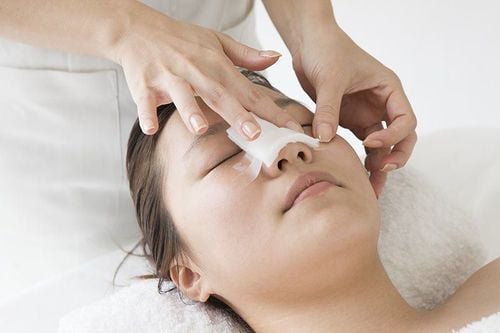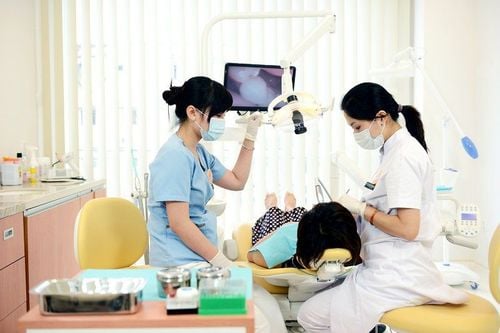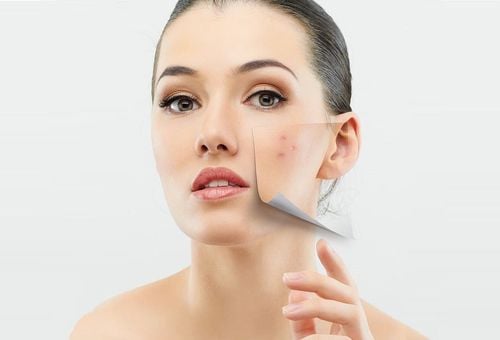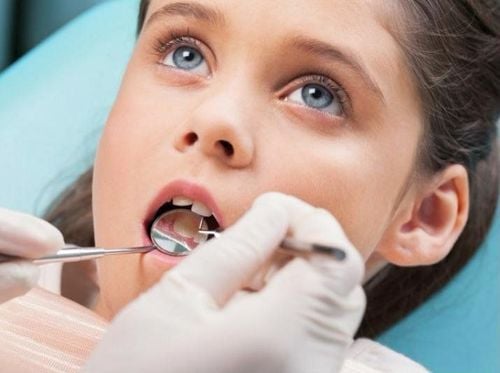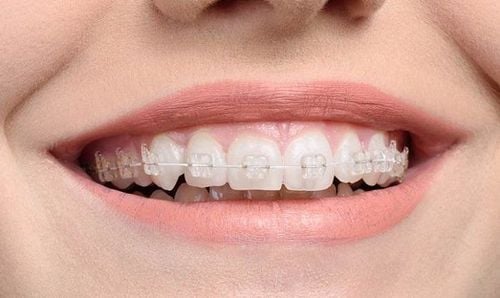This is an automatically translated article.
Mascara is one of the most trusted beauty products used by women for makeup. But before applying thick lashes, let's see what might be hiding in your favorite mascara. What is mascara made of? How safe is your mascara? The following article will help you better understand mascara.
1. What is Mascara?
Millions of women around the world have used mascara to make their lashes look younger. It has appeared since the 19th century and has gradually become one of the indispensable beauty tools of women.
The composition of Mascara usually includes carbon black pigment or iron oxide to darken the eyelashes; a polymer to form a film that covers the eyelashes; a preservative; and waxes or thickening oils such as lanolin, mineral oil, paraffin, petrolatum, castor oil, carnauba wax, and candelilla wax.
There are two basic choices: A water-free formula, or an emulsion of water and oil. Water-free formulas tend to be waterproof and are less likely to smudge or flake. But they can be difficult to remove. Emulsions are easier on the lashes but can flake or smudge.
In the 1930s, eyelash enhancers contained scary ingredients like turpentine, lead, and aniline, a hair dye ingredient, all of which could put people who used them at risk of blindness. Currently, regulations strictly limit ingredients to those that are safe to apply to the eye area, but you should be on the lookout for thimerosal, a preservative that can cause conjunctivitis and eyelid skin inflammation ( ban). Thimerosal is still used in some mascaras.
To see if your mascara is flaking or leaking, check how much water it contains. The less water on the ingredient list, the less likely the mascara will smudge.
However, experts recommend limiting the use of waterproof, smudge-proof formulas made with little or no water. The extra effort required to remove these products can damage lashes, causing them to break or fall out.
2. 8 Unsafe Ingredients to Avoid in Mascara
2.1. Paraben
Parabens are harmful preservatives added to beauty products to increase shelf life. Unfortunately, they not only prevent bacteria from growing in our mascara, but they also mimic the hormone estrogen and are known as endocrine disruptors. That means the parabens in our mascara can affect hormones in the body. Parabens have also been linked to breast cancer, skin cancer, reproductive problems, and problems developing during pregnancy.
Parabens are known skin irritants, which can cause rashes, swelling, and redness. Have you ever wondered why mascara makes your eyes itch? That's because parabens are already irritating your eyes.
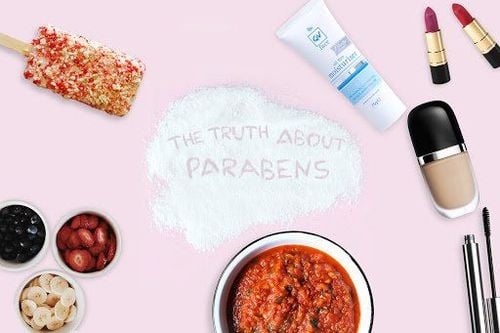
Paraben là chất bảo quản có hại được thêm vào các sản phẩm làm đẹp để tăng thời hạn sử dụng
2.2. Propylene glycol
Propylene glycol is a petroleum derivative used in mascara. It is also a commonly used food additive (such as E1520) and is also found in deodorants, toothpastes, mouthwashes, tobacco products and other industrial products such as antifreeze and oils. brake.
While the US Food and Drug Administration considers propylene glycol "safe", it has been linked to skin and respiratory problems. According to the Material Safety Data Sheet for propylene glycol, the chemical is a strong skin irritant and has been linked to contact dermatitis. The scientists go on to warn that this ingredient can inhibit skin cell growth and damage cell membranes, causing rashes, dryness, and superficial damage. The Environmental Working Group (EWG) rates this as a moderate health risk for skin and lung irritation, and there are concerns related to cancer, developmental and reproductive toxicity, allergies immunotoxicity, irritation and absorption enhancement, as well as systemic toxicity.
Propylene glycol also enhances absorption. That means other harmful chemicals in your products are more likely to penetrate the surface layer of your skin and go deeper into the bloodstream.
2.3. Retinyl acetate (vitamin acetate)
Many people think that because it is a vitamin, Retinyl acetate is safe to use. But the EWG classifies retinyl acetate as a high-risk ingredient in cosmetics. It is known to induce biochemical or cellular changes and has been associated with aggressive cancer mutations in studies. Canada has banned the use of retinyl acetate used in cosmetics.
2.4. Aluminum powder
Aluminum powder is a metallic substance consisting of finely ground aluminum particles and is used to color mascara. It is also a known neurotoxin and interferes with the essential functions of our cells and bodily processes. Long-term exposure to aluminum powder can impair the body's ability to excrete heavy metals such as mercury. This can make any amount of heavy metal exposure in the body more toxic.
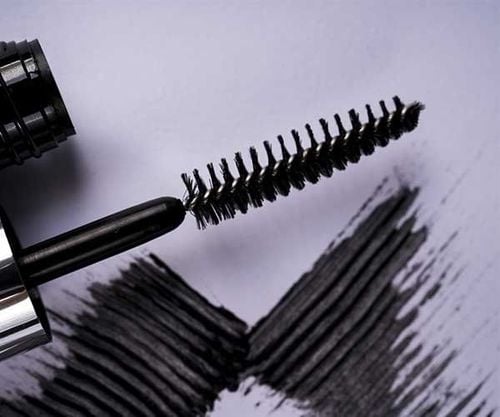
Bột nhôm là một chất kim loại bao gồm các hạt nhôm được nghiền mịn và được sử dụng để tạo màu cho mascara
2.5. Charcoal dye
Coal tar dyes contain heavy metals and are used as colorants in mascaras. Alternatively, you may find them listed as a five-digit number preceded by a Cl. (includes D&C Blue 1, Green 3, Yellow 5, Yellow 6, Red 33, etc.) They may also be labeled as Aminophenol, Diaminobenzene or Phenylenediamine. These dyes are considered carcinogens (increase cancer risk with exposure) and heavy metals can be toxic to the brain.
2.6. Spice
We all need to be wary of anything with "fragrance". Fragrances are a trade secret and their ingredients do not need to be disclosed. Perfume is mainly used to mask the smell of other chemicals in the product, mainly the coal tar dye in mascara. Perfume can be irritating to the eyes and skin. Other reactions may include dizziness, headache, acne, and allergies. Fragrances are sometimes listed as “parfums” in ingredient lists.
2.7. Formaldehyde-related preservatives
Formaldehyde is a carcinogenic impurity secreted by some cosmetic preservatives. It is rated very dangerous by the EWG and classified as a carcinogen. It has also been linked to contact dermatitis when used in cosmetics and beauty care products. It is often labeled under various names such as DMDM, imidazolidinyl urea, methenamine, diazuli dinyl urea, and quaternium-15 – just a few that we may have heard.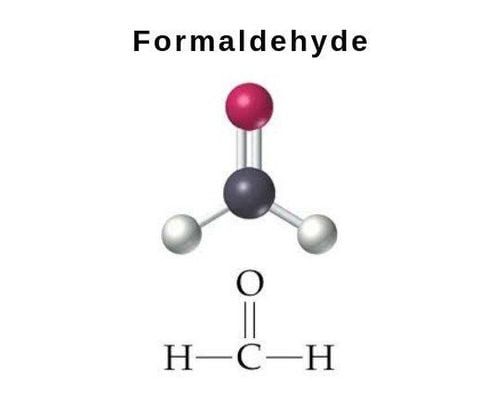
Formaldehyde là một tạp chất gây ung thư do một số chất bảo quản mỹ phẩm tiết ra
2.8. Food Preservatives BHT and BHA
Food preservatives Butylated hydroxyanisole (BHA) and related compound butylated hydroxytoluene (BHT) are used as preservatives in mascara and are considered endocrine disruptors. Studies have linked BHA to cancer. They are also harmful to fish and other wildlife.
3. What is Mascara made of?
With countless lengthening, strengthening, nourishing, waterproof and curling mascaras to choose from, it's likely many women have more than one in their beauty bag. Different mascaras are made up of different ingredients.
In essence, mascara is made from a combination of oils and waxes to create consistency, pigment and color. Mascara may also include chemical preservatives to help prevent clumping, smudging, or layering. Interestingly, mascara has been used since ancient times. The Egyptians (followed by the Greeks and Romans) used kohlrabi to blacken their eyelashes, eyebrows, and eyelids to ward off evil spirits.
While mascara may no longer be used to ward off evil spirits, some have healthier ingredients than others. Nearly all mascaras contain iron oxide - a chemical compound that is considered non-toxic and is often used in conjunction with titanium dioxide. Oils used in mascara include natural ingredients such as eucalyptus oil, sesame seed oil, and lanolin. Beeswax and carnauba wax are often used to help create consistency, and glitter or shimmer mascaras can also include fish scales (also a common ingredient in lipsticks).
If you regularly wear mascara on a daily basis, then invest in mascara made with high-quality ingredients. Whichever you choose, be sure to take a moment to peruse the ingredient list before purchasing.
Mascara is one of the most trusted beauty products by women. Who doesn't love to have long and curled eyelashes? Women around the world agree that dramatic lashes can instantly transform them into a different person. And it is estimated that the average woman spends almost $4,000 on mascara in her lifetime. Many of us don't think twice before applying our favorite mascara. They are often not too concerned about their ingredients and this can have bad consequences for their eyes.
Please dial HOTLINE for more information or register for an appointment HERE. Download MyVinmec app to make appointments faster and to manage your bookings easily.
Reference source: webmd.com




